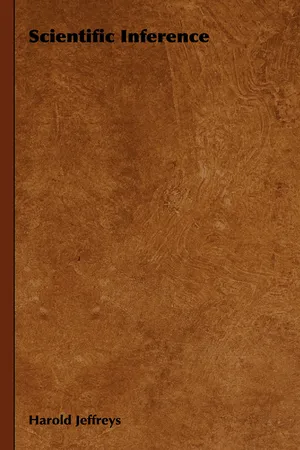
- 280 pages
- English
- ePUB (mobile friendly)
- Available on iOS & Android
eBook - ePub
Scientific Inference
About this book
Originally published in 1931. The present work had its beginnings in a series of papers published jointly some years ago by Dr Dorothy Wrinch and myself. Both before and since that time several books purporting to give analyses of the principles of scientific inquiry have appeared, but it seems to me that none of them gives adequate attention to the chief guiding principle of both scientific and everyday knowledge that it is possible to learn from experience and to make inferences from it beyond the data directly known by sensation. Discussions from the philosophical and logical point of view have tended to the conclusion that this principle cannot be justified by logic alone, which is true, and have left it at that. In discussions by physicists, on the other hand, it hardly seems to be noticed that such a principle exists. In the present work the principle is frankly adopted as a primitive postulate and its consequences are developed. It is found to lead to an explanation and a justification of the high probabilities attached in practice to simple quantitative laws, and thereby to a recasting of the processes involved in description. As illustrations of the actual relations of scientific laws to experience it is shown how the sciences of mensuration and dynamics may be developed. I have been stimulated to an interest in the subject myself on account of the fact that in my work in the subjects of cosmogony and geophysics it has habitually been necessary to apply physical laws far beyond their original range of verification in both time and distance, and the problems involved in such extrapolation have therefore always been prominent.
This is a high quality digital version of the original title, thus a few of the images may be slightly blurred and difficult to read.
Tools to learn more effectively

Saving Books

Keyword Search

Annotating Text

Listen to it instead
Information
Table of contents
- Cover
- Half title
- Title
- Contents
- Preface
- Chapter I Logic and Scientific Inference
- Chapter II Probability
- Chapter III Sampling
- Chapter IV Quantitative Laws
- Chapter V Errors
- Chapter VI Physical Magnitudes
- Chapter VII Mensuration
- Chapter VIII Newtonian Dynamics
- Chapter IX Light and Relativity
- Chapter X Miscellaneous Questions
- Chapter XI Other Theories of Scientific Knowledge
- Appendix I Probability in Logic and Pure Mathematics
- Appendix II Infinite Numbers
- Appendix III The Analytic Treatment of The Sine and Cosine
- Lemmas
- Index
Frequently asked questions
Yes, you can cancel anytime from the Subscription tab in your account settings on the Perlego website. Your subscription will stay active until the end of your current billing period. Learn how to cancel your subscription
No, books cannot be downloaded as external files, such as PDFs, for use outside of Perlego. However, you can download books within the Perlego app for offline reading on mobile or tablet. Learn how to download books offline
Perlego offers two plans: Essential and Complete
- Essential is ideal for learners and professionals who enjoy exploring a wide range of subjects. Access the Essential Library with 800,000+ trusted titles and best-sellers across business, personal growth, and the humanities. Includes unlimited reading time and Standard Read Aloud voice.
- Complete: Perfect for advanced learners and researchers needing full, unrestricted access. Unlock 1.4M+ books across hundreds of subjects, including academic and specialized titles. The Complete Plan also includes advanced features like Premium Read Aloud and Research Assistant.
We are an online textbook subscription service, where you can get access to an entire online library for less than the price of a single book per month. With over 1 million books across 990+ topics, we’ve got you covered! Learn about our mission
Look out for the read-aloud symbol on your next book to see if you can listen to it. The read-aloud tool reads text aloud for you, highlighting the text as it is being read. You can pause it, speed it up and slow it down. Learn more about Read Aloud
Yes! You can use the Perlego app on both iOS and Android devices to read anytime, anywhere — even offline. Perfect for commutes or when you’re on the go.
Please note we cannot support devices running on iOS 13 and Android 7 or earlier. Learn more about using the app
Please note we cannot support devices running on iOS 13 and Android 7 or earlier. Learn more about using the app
Yes, you can access Scientific Inference by Harold Jeffreys in PDF and/or ePUB format, as well as other popular books in Biological Sciences & Science General. We have over one million books available in our catalogue for you to explore.